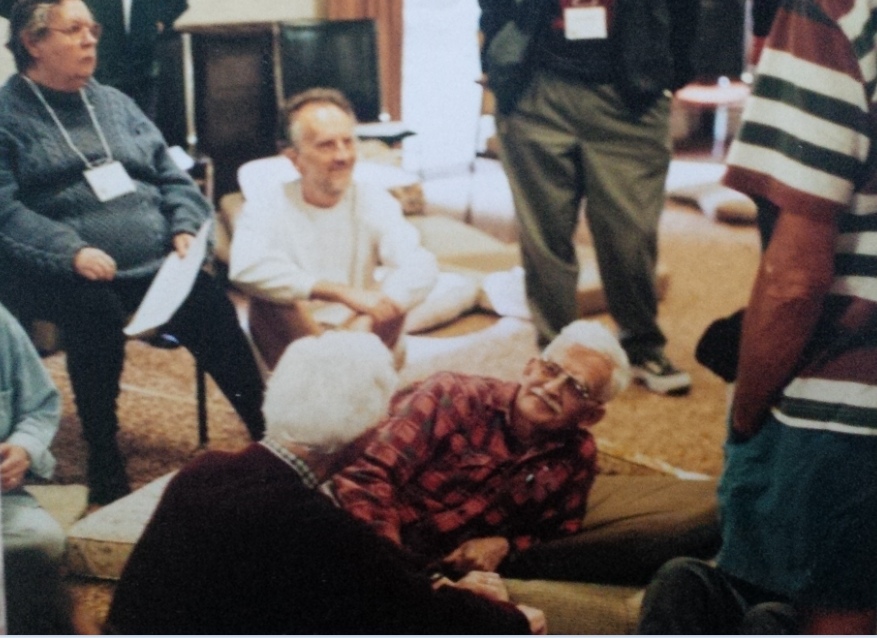Dan Heap was a saint.
I suspect he would completely reject that designation, but I think he was.
I first met Dan (to be accurate I knew him as Don) at (where else?) a protest march in downtown Toronto one chilly afternoon in 1995. His wife Alice and a group of parishioners at the Church of the Holy Trinity had just hired me as their new Social Justice Worker. He was both surprised and delighted that I would be at this march and almost immediately — and with the great urgency he was known for — began to talk about the things we could do now that I had this job.
One of the most endearing qualities I remember about him from that first meeting, and throughout the time I knew him, was his humility. By that time he had already been an Anglican priest for many years, a city councillor, a Member of Parliament for 12 years, participated in historic picket lines and I’m sure had a bookful of other experiences. He was 70 years old, more than double my age at that time, and I never once felt from him — despite his experience and age — that he thought of me as anything other than an equal.
Over the five years we worked together, there were many marches, Social Justice Committee meetings, church services, telephone calls and encounters.
There were also two arrests together.
The first was in January 1996. The Harris government was implementing its so-called ‘common sense revolution’ and that meant cuts to social services, the vilification of the poor and the deaths of homeless people on the streets of wealthy Toronto. The idea was to march from the church to Queen’s Park (the provincial legislature) and pour theatrical blood on the front steps of the building. As Dan was quoted in the media after he was charged, “We poured something that symbolized blood on the steps to symbolize that the government of Ontario under Harris has blood on its hands. People are suffering because of the cuts.”
In the church bulletin that Sunday I (likely in too much of a hurry to meet its deadline) wrote that we had poured blood on the steps, inadvertently missing the ‘theatrical’ qualifier. After Dan read that, it was my first, and maybe only, experience of his sometimes referred to temper. He was upset at me, and rightly so, and asked me to make a clarification announcement to the congregation that morning, which I did. I had let Dan down, but remembering that time now, a stronger memory is how he forgave me quickly and never mentioned it again.
Our next arrest together was that May Day. At that time, the idea was to occupy the intersection of King and Bay streets in Toronto’s financial district, declaring it a ‘greed free zone.’ Part of the action included setting up buildings made of cardboard to represent this newly created zone, instead of the World Bank, for instance, we had a cardboard box World Credit Union building. Dan, myself and 13 others were arrested that May Day morning after successfully (if briefly) creating this anti-capitalist zone among the big bank buildings.
There were two great photos of Dan at that action in the Toronto Star the next morning, but perhaps best of all was the headline — ‘Bay Street greed free? Not for long.’ The intent was likely to belittle our effort as the article noted we only held the intersection for about 20 minutes. But I always read the headline as an unintended acknowledgement by the country’s largest circulation newspaper that Bay Street is a place of greed. About a year later a judge acquitted us of the charges, stating there was space in a democracy for actions such as ours.
I know Dan was a devout socialist, but I’m not entirely sure why a 70 year old retired Member of Parliament would engage in such a Quixotic endeavour as this. However, he treated it with great seriousness of purpose and I’m sure glad to be able to say that I shared the back of a police van with him, the both of us in handcuffs.
Dan cared deeply about justice, peace, homelessness, the rights of Indigenous peoples and many other issues.
I know that his faith was central and incredibly important to him and that he wanted church to be more Christian, radical and inclusive. So much so that he fasted and prayed in preparation for an intervention where he and two others sought to remove a a bronze sword affixed to a stone cross in front of an Anglican church on Bloor Street. He believed that a symbol of war and violence had no place on the cross.
He was caring, principled, committed and selfless. The fire that fuelled his fight burned long and bright. You could sense that in the intensity of his eyes during a conversation. He set an example for me and many others that seems impossible to match, but through his humility gave us the space to want to keep trying.
Brent Patterson is the Political Director at the Council of Canadians. He works with the Council’s chairperson Maude Barlow, its campaigners, organizers and chapters across the country on trade, energy, water, and health care issues. The Council has political staff in Ottawa, Vancouver, Edmonton, Toronto, Halifax, Delhi, Durban and Mexico City.
Photo: Brent Patterson



